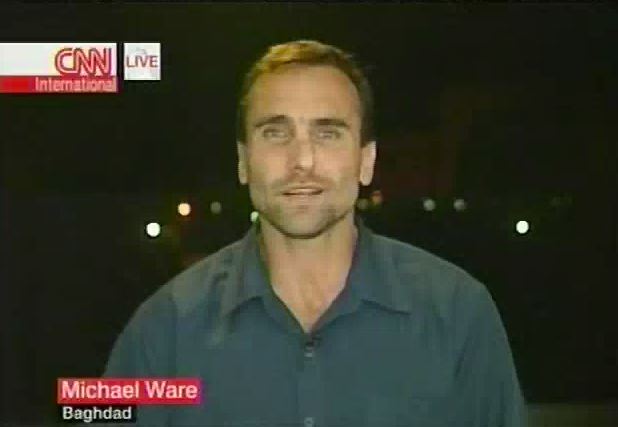
Michael Ware
YWT: "It's a matter of word play, isn't it?"

Click
photo to play
Length: 5:23
JIM CLANCY: U.S.
officials say Iraq's government has agreed to a
realistic timeline of steps that could finally end
years of war.
HALA GORANI: The news comes just two weeks before
U.S. elections, as polls show most Americans believe
no side is winning in Iraq.
Here's a quick look at the latest.
CLANCY: Now, the top U.S. political and military
officials in Iraq say success is possible. They say
Iraqi forces should be ready to take over security
responsibilities within 12 to 18 months.
GORANI: As violence takes more and more lives, a new
poll shows only one in five Americans believes that
the U.S. is winning the war.
CLANCY: A senator from President Bush's own party
calls Iraq on the verge of chaos.
GORANI: Let's begin with a closer look at the steps
meant to stem the bloodshed and mend a bitter
sectarian divide. They cover everything from
disbanding militias, to sharing the profits from
Iraq's vast oil reserves.
Michael Ware joins us now from Baghdad with more.
Michael, before we get to you, I would like you to
listen in on something the U.S. ambassador to Iraq,
Zalmay Khalilzad, said regarding Muqtada al-Sadr, and
then I'll have you analyze it and react.
Let's listen.
(BEGIN VIDEO CLIP)
KHALILZAD: Muqtada al-Sadr has said that they do not
represent him and that those who carry weapons
without government permission need to be dealt with.
He has expressed support for the government, and now
the government needs to move forward.
(END VIDEO CLIP)
GORANI: Michael, does this sound realistic, given
your knowledge on the ground of how these militias
operate, that they'll agree to disband and support
the current government?
MICHAEL WARE, CNN CORRESPONDENT: Well to be frank,
Hala, no, not at all. I mean, it's a matter of word
play, isn't it? I mean, what is a militia?
Muqtada is against militias, but does he consider his
forces of the Mahdi army, Jaish al Mahdi, to be a
militia? The dominant political faction within the
Shia alliance within this government, the party
SCIRI, says that it's militia is not a militia
either. The Badr militia says, "We no longer bear
arms, and therefore we have developed into a
humanitarian organization," which U.S. and British
intelligence say has infiltrated the security forces
and is linked to many other death squads.
So, really, it is, what is a militia and who thinks
what that might be -- Hala.
GORANI: And what about this timeline, 12 to 18 months
-- we've heard this before. We've heard six months a
few years ago -- and how easy is it to predict or
difficult it is to predict what will happen in Iraq
18 months from now? Certainly a year and a half ago
it was -- it would have been very difficult for us to
predict the situation -- what the situation is now --
Michael.
WARE: Oh, absolutely. I mean, it's proven time and
time again that Iraq is not something that one can
foretell with any kind of accuracy.
We've heard timelines like this so often before. And
these benchmarks that have now been set by Ambassador
Khalilzad, we've heard each and every one of them
just about before as well.
He says the Iraqi government must now step up to
these benchmarks. Well, they didn't a year ago. They
didn't 18 months ago. The real question is, for
Ambassador Khalilzad, what happens when these
benchmarks are not met -- Hala.
GORANI: Yes, that is the question. What does happen
then? Where does that leave not only the U.S.
military, but Iraqis themselves?
WARE: Well, that's -- that is a great question. I
mean, the government says ultimately they answer back
to the people and to the parliament. But, I mean,
again, that's just savvy politicking.
The reality is that certain militias and political
blocs have carved up power here. Obviously to the
exclusion of the Sunnis, a group that the American
administration is particularly targeting.
But this government alone in the form of Prime
Minister Maliki is relatively powerless and is merely
propped up by the Americans and to a lesser degree,
by Muqtada al-Sadr himself, the head of this, you
know, militia that the Americans are targeting --
Hala.
GORANI: All right. Michael, one last question there
regarding the division of wealth, the division of
Iraqi oil.
If this, as the U.S. says, has become more a fight
over resources rather than a resistance against what
they perceive as U.S. military occupation, if there
is a legal framework surrounding the division of
resources in Iraq, will that take the sting out of
the sectarian conflict or not?
WARE: I very much doubt it, because whatever is on
paper doesn't necessarily play out in reality. I
mean, you know, the people who control this
government or the dominant factions have so far not
shown a proclivity to share.
And we've seen the head of SCIRI today during prayers
for Eid reiterate his party's push to divide the
country. This is the very thing that the Sunnis fear,
that the oil will go with the two other partitions.
So this is something that Ambassador Khalilzad
hammered, and this is one of the key benchmarks. If
it's not met, what happens? He's hinted that an
international compact that's being worked on to get
the Iraqi government to commit to do what's
necessary, he said today, most interestingly, in
exchange for the international community's support,
hinting that if they don't do this, they are going to
start losing international community support.
Does that mean money? That's the real question --
Hala.
GORANI: All right. Michael Ware live in Baghdad.
Thanks, Michael -- Jim.